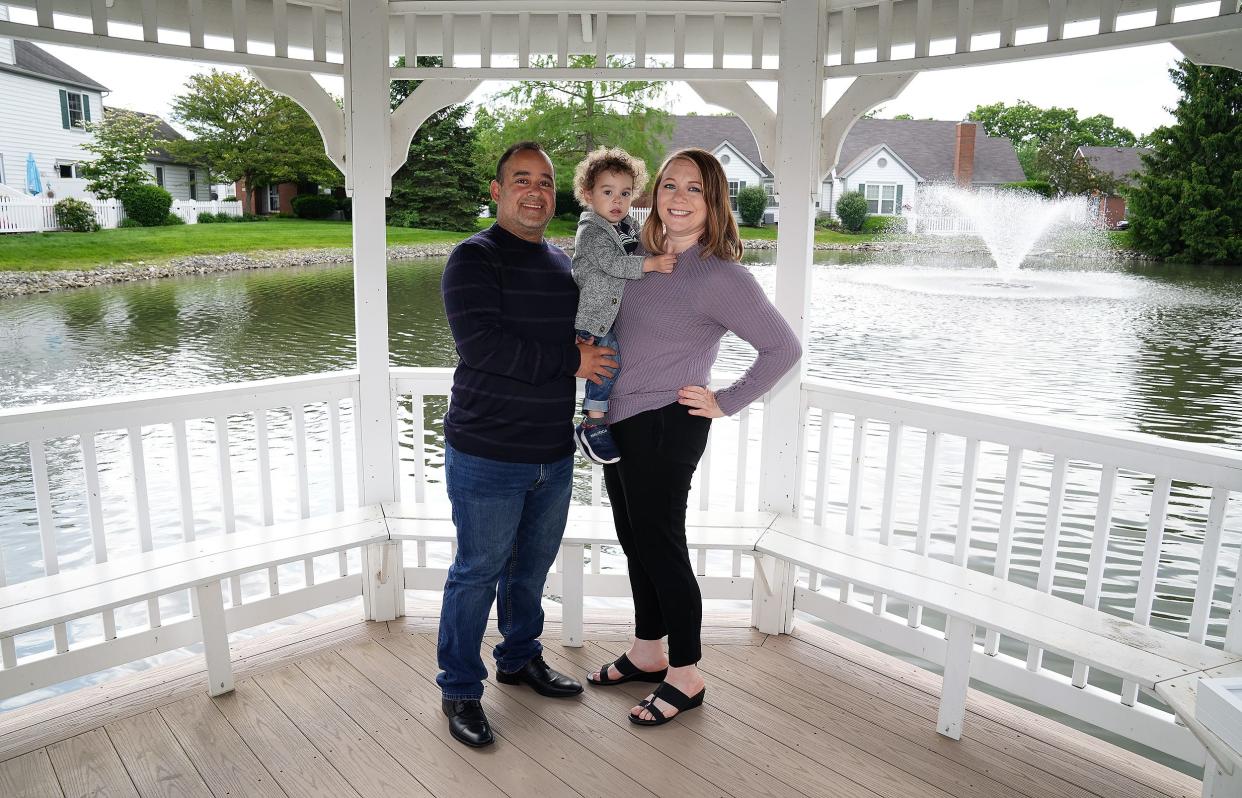Columbus woman shares 'traumatizing' experience going out of state for abortion

When Meg Piasecki found out that Women Have Options Ohio was going to help pay for her to get an abortion in Colorado, she started crying and shaking.
“To me, that meant God always provides for me,” said Piasecki, now 36.
Going out of state: Where can Ohioans get abortions after the U.S. Supreme Court ruling?
Piasecki, of the Northwest Side, got an abortion in Colorado when she was almost 25 weeks pregnant in 2018. It happened after finding out at her 20-week ultrasound that the baby she and her partner, Ricardo Jimenez, very much wanted may have had heart problems.
By the time they got answers, which included that there were chromosomal abnormalities, it was too late to do the procedure in Ohio. At the time, abortions could be performed in Ohio up to 20 weeks into a pregnancy.
The day that Roe v. Wade fell: Panic, praise at Ohio's abortion clinics
“It was an eye-opening experience for me with the abortion laws. I had no idea it was that strong,” Piasecki said.
She said she wishes she could have had the procedure done locally.
"It would've been so much better to just start grieving in your own bed," Piasecki said. "I couldn't recover and rest and also grieve."
Some say more women will seek out-of-state abortion care
Today, the laws are even stricter.
On June 24 — hours after the U.S. Supreme Court overturned Roe v. Wade, the 1973 ruling that made abortion a constitutional right — a federal court judge lifted an injunction on an Ohio law making abortion illegal in Ohio once fetal cardiac activity is detected, at about six weeks into a pregnancy.
Though they say there is more work: Anti-abortion Ohioans 'joyous' over Supreme Court decision
Since the injunction was lifted, more and more women in the early stages of pregnancy are having to make quick decisions on whether or not to get an abortion. And that means, in many cases, figuring out how and where they can go to do so, said Jordyn Close, board chair of Women Have Options Ohio, a nonprofit abortion fund that offers financial assistance and other support for patients seeking abortion services.
Since June 24, the group has been helping abortion clinics reschedule patients with appointments in Ohio to clinics in other states such as Illinois, Pennsylvania and New York.
Situations like Piasecki's — where people may seek abortions later into their pregnancies and have to go out of state — are going to become more common because of Ohio's added barriers to abortion care, Close said.
6-week ban uproots Ohio abortion access: Canceled appointments, out-of-state referrals
"No one should have to leave their home state or even their home county or town to access the care that they need," she said. "It is stressful. We make sure that we're just supporting people through that process."
Close said all the clinics in the state are prepared to help women find a place where they can get care, even if out of state.
The group is able to help women with the financial cost of abortion through private donations. It has gotten about $400,000 since the Supreme Court's decision on Dobbs v. Jackson Women's Health Organization was leaked in May, Close said.
Supreme Court decision: Ohio officials react as Roe v. Wade overturned
As of about two weeks ago, it had spent $300,000 in direct-patient funding and grants to abortion clinics, she said, and it hasn't had to turn away anyone who asked for help.
The farther along a pregnancy is, the more an abortion may cost, according to Planned Parenthood, and that's not factoring in cost for travel and lodging in another state if it's too late for a woman to get care in Ohio.

'The whole process was traumatizing'
Without the help Piasecki got from Women Have Options — more than $7,000 toward the $10,000 procedure — she wouldn't have had the financial means to later consider having her son Asher, who is now 2, she said.
Two other organizations contributed smaller amounts for Piasecki and Jimenez to travel for the procedure.
All told, the total cost was likely around $14,000 for travel, food, lodging and the procedure, Piasecki estimated, not to mention the costs of her pregnancy care before she found out about the fetus' chromosomal abnormalities.
“The whole process was traumatizing,” Piasecki said. “This was a wanted pregnancy.”
After finding out that her fetus may have cardiac abnormalities, it took weeks for the couple to get all the answers they felt they needed to decide whether or not to proceed with the pregnancy.
Piasecki underwent several tests over three to four weeks and eventually found out the fetus was missing 116 genes and half of chromosome 10. The DNA test showed that, due to the chromosomal deletion and missing genes, Piasecki's baby likely would be born with heart and brain issues, among other challenges, and would need at least two surgeries after birth. They could find no other living people with the same deletions, despite research, she said.
"The people who have that same deletion aborted," she said.
For Piasecki and Jimenez, getting an abortion was a heartbreaking decision they never thought they’d have to make.
"It's so huge to lose a child," she said. "Sometimes you never know why things happen. So I don't know why it happened. And I'll only know when I see God one day in heaven and I'll ask him."
'It doesn't seem fair'
In 2019, about 9% of abortions were performed on women living outside the state where the procedure was done, according to CDC data reported by the Pew Research Center. Before the 1973 Roe v. Wade decision, that figure stood at 41%.
In Piasecki's case, she flew into Colorado on a Monday and went to the abortion clinic on a Tuesday. Jimenez and Piasecki got to see their daughter, whom they named Praisley, before leaving the clinic.
Her partner was the only one with her, as her mother couldn't afford to go, and Piasecki had to board a plane hours after going through labor, she said.
Today, Piasecki, who is 18 weeks pregnant with another child, fears for other women who are seeking care like she once got.
"There's a lot of details when you travel. It's stressful. You terminate a child and you just delivered it," she said. "Then all of a sudden you just take a flight. It doesn't seem fair."
dking@dispatch.com
@DanaeKing
This article originally appeared on The Columbus Dispatch: Out-of-state abortion: Columbus woman shares experience

